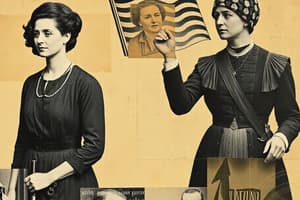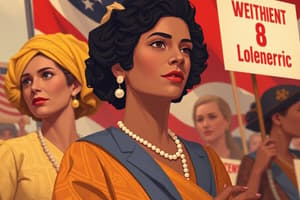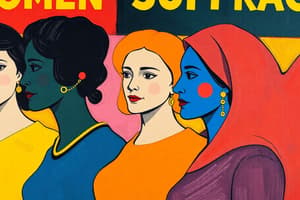Podcast
Questions and Answers
Susan B. Anthony was put on trial in 1872 for casting her ballot during the presidential election.
Susan B. Anthony was put on trial in 1872 for casting her ballot during the presidential election.
True (A)
The 19th Amendment granted only white American women the right to vote.
The 19th Amendment granted only white American women the right to vote.
False (B)
Women's suffrage advocates had little impact on the eventual success of the 19th Amendment.
Women's suffrage advocates had little impact on the eventual success of the 19th Amendment.
False (B)
The passage of the 19th Amendment allowed women to take on more active roles in political life.
The passage of the 19th Amendment allowed women to take on more active roles in political life.
There is no debate over whether all women benefited equally from the passage of the 19th Amendment.
There is no debate over whether all women benefited equally from the passage of the 19th Amendment.
The 19th Amendment led to increased social protections for all women, not just working mothers.
The 19th Amendment led to increased social protections for all women, not just working mothers.
The 19th Amendment was initially proposed by Representative George H.W. Bush in Congress.
The 19th Amendment was initially proposed by Representative George H.W. Bush in Congress.
The ratification process of the 19th Amendment required approval from two thirds of the state legislatures.
The ratification process of the 19th Amendment required approval from two thirds of the state legislatures.
The deadline for ratification of the 19th Amendment was met smoothly without any delays.
The deadline for ratification of the 19th Amendment was met smoothly without any delays.
Before the 19th Amendment, unmarried women had the right to vote in elections.
Before the 19th Amendment, unmarried women had the right to vote in elections.
Jeannette Rankin used her position as a woman candidate to advocate for U.S. involvement in World War I.
Jeannette Rankin used her position as a woman candidate to advocate for U.S. involvement in World War I.
The adoption of the 19th Amendment coincided with the Great Migration period in the United States.
The adoption of the 19th Amendment coincided with the Great Migration period in the United States.
Flashcards are hidden until you start studying
Study Notes
Women's Suffrage and the Right to Vote
The 19th Amendment was a crucial step towards equal rights and representation for all citizens of the United States, regardless of their sex. It granted American women, both white and African-American, the right to vote by prohibiting any state from denying the vote based solely on gender. This marked a significant milestone in the history of democracy and the struggle for equality.
Prior to the passage of this amendment, women had been actively fighting for voting rights through various forms of activism. One notable figure in this movement was Susan B. Anthony, who faced trial when she cast her ballot during the presidential election of 1872. Her actions and those of other advocates laid the groundwork for the eventual success of the 19th Amendment.
In addition to the right to vote, the passage of the 19th Amendment also opened doors for women to take more active roles in political life. They were now able to run for office themselves, thus shaping the course of local, national, and world events.
Despite its significance, there is some debate over whether all women benefited equally from the passage of the 19th Amendment. Some argue that it did little to change the lives of black women, while others point out that women's suffrage led to increased social protections for all women, including working mothers. Nonetheless, few would dispute the importance of securing voting rights for women overall.
Ratification Process
The process leading up to the adoption of the 19th Amendment involved several key steps. Initially proposed by Representative George H. Williams in Congress, it made its way through committee hearings before being passed by the House of Representatives in May 1919. Once approved, the proposal went to the states where it needed to be ratified according to Article V of the US Constitution. In order to become part of the Constitution, three fourths of the state legislatures must approve it within seven years of submission.
However, a technicality delayed the completion of the necessary number of votes until August 1920, due in part because Tennessee became the thirty-sixth state to approve the measure just six days prior to the deadline. This delay has led many to consider August 18, 1920, as the official day enfranchisement occurred.
While the majority of states supported the amendment, opposition came primarily from southern states concerned with how women might affect the outcome of elections. Ultimately, the power and organization of proponents of the cause overcame these obstacles, making the 19th Amendment one of only two constitutional amendments adopted under pressure exercised directly upon the public by means of a national campaign.
Impact of the 19th Amendment
The impact of the 19th Amendment cannot be overstated. Before its passing, unmarried women could legally hold property, buy land, enter into contracts, and even inherit property, yet they could not vote. With the adoption of the amendment, however, women gained access to full democratic participation, allowing them to shape policies affecting everything from healthcare to education, as well as influencing decisions on war and peace.
Furthermore, women's newly acquired voting rights immediately affected politics, particularly for women candidates like Jeannette Rankin, who used her position to speak against U.S. involvement in World War I after receiving thousands of letters pleading her to do so. She subsequently won reelection in 1918 and again in 1940.
Another important aspect of the 19th Amendment lies in its historical context. Its adoption coincided with the Great Migration period, which saw millions of African Americans migrate northward seeking better economic opportunities and escaping Jim Crow laws. As such, while the 19th Amendment brought about formalized inclusion for women, it also highlighted disparities experienced by people of color in terms of citizenship rights and protections.
Studying That Suits You
Use AI to generate personalized quizzes and flashcards to suit your learning preferences.




